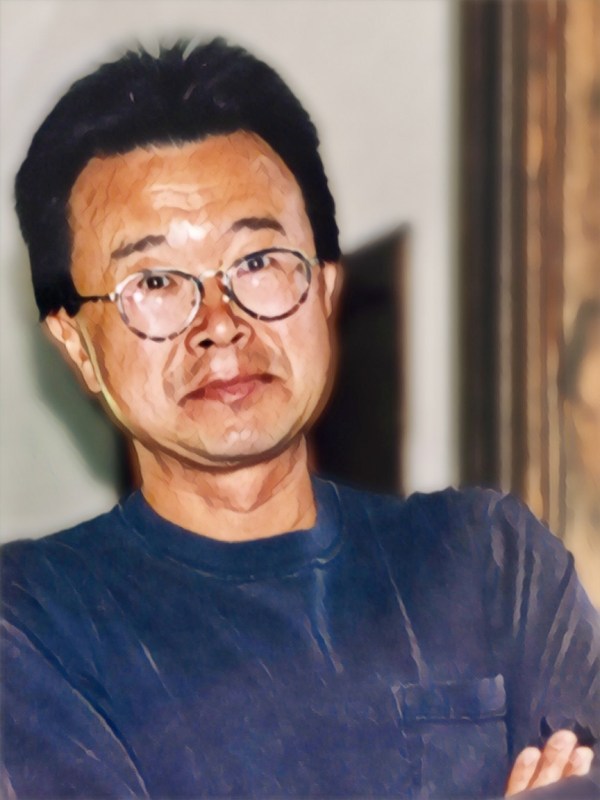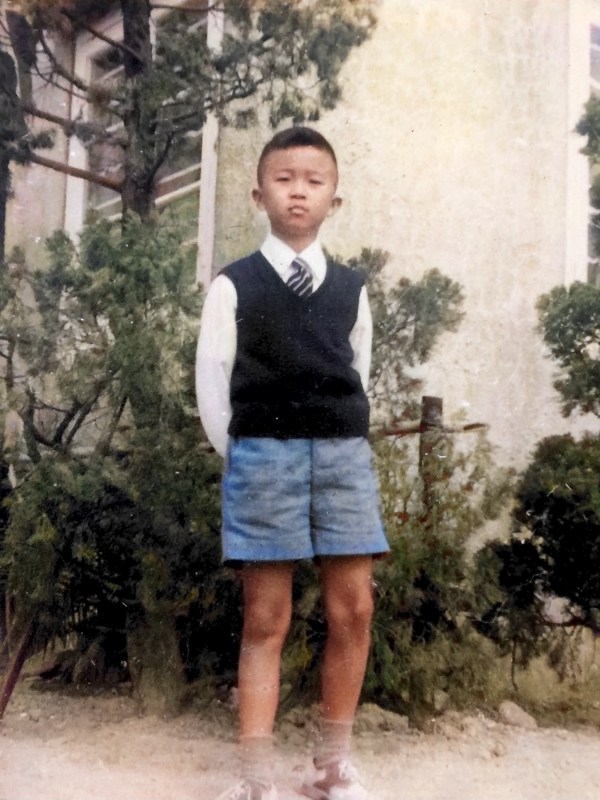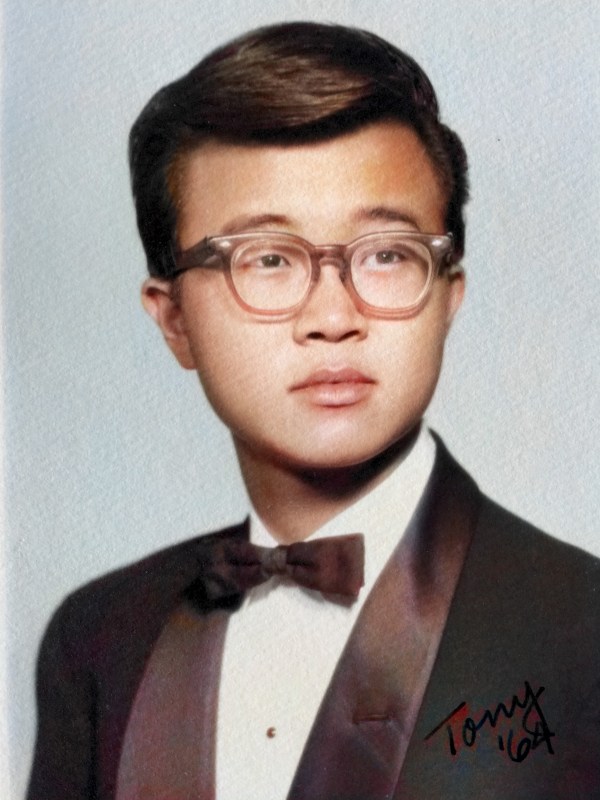Tony Shih
Tony (Anthony Yuan Yuan) Shih was born in Shanghai China in 1946, the first child of parents Regina Wei Ka Shih and Paul Hung Chen Shih. Tony’s sister Lily was born in Shanghai the following year, and within a year the family moved to Hong Kong, when Paul’s business became untenable with the rise of the Communist regime. Eighteen months later Tony’s sister Elizabeth was born.
At age 12 Tony immigrated with his family to San Francisco, where he attended Lowell High School, the district wide school for academically gifted students. Tony was active in student government at Lowell, and in the summer after his junior year he made his first visit to Santa Barbara, participating in a UCSB summer session for student government leaders who were high school juniors. It was Tony’s first visit to Santa Barbara, and it was love at first sight. He enrolled at UCSB in the Fall of 1964, and, apart from a few brief detours, Santa Barbara would remain his home for the remainder of his life. It is also where he formed life-long friendships with his fraternity brothers at Sigma Phi Epsilon, many of whom remained in or returned to Santa Barbara to build careers, raise families, eat well, and drink fine local wines, typically supplied by Tony.
Tony was active in Associated Students, UCSB’s student government, throughout his undergraduate career, serving as president of his sophomore class and in A.S. Legislative Council in subsequent years. The concerns of student government in the mid-sixties were strictly local, and Tony took on such issues as reforming the process for selecting a homecoming queen and whether the spring concert on campus should feature The Righteous Brothers or Allan (“Hello Mudddah”) Sherman. But the times they were a changin,’ and Tony was on the vanguard of that change. Tony and his close friend and fraternity brother Chris Gautschi put Associated Students on record as opposing a bill in the state legislature to require UC graduates to pay back the state for the cost of their education and successfully lobbied Santa Barbara’s two representatives to withdraw their support for the bill. In the spring of 1966 Tony was the only class officer willing to speak out critically about the Vietnam war, and he quickly became recognized across campus as the leading spokesperson for students opposed to the war.
In 1967, Tony introduced a resolution to the AS Legislative Council to put the student council “on record in opposition to American military involvement in Vietnam … and in favor of unilateral American de-escalation and negotiation with the North Vietnamese government and National Liberation front.” Campus administrators were quick to point out that Tony was taking on a UC systemwide policy known as the “Kerr Directive,” specifying that student governments must confine their business to on-campus issues. Some of Tony’s fellow campus reps agreed with the policy, with one arguing that “it is more important that we spend our time on such things as academic reform and even a five-cent coffee refill at the UCen, things we can see with tangible and realistic evidence.” Tony responded that it was important to demonstrate that opposition to the war extended beyond the “hippy element of the peace movement.” He explained that passage of the resolution would demonstrate that opposition the war and to the university’s complicity was just as important to the “clean cut” corner the student community that sought to work through proper channels to express their views. The resolution passed overwhelmingly.
By 1968, campus politics across the country had taken a radical turn, and protests over the war and civil rights had turned to “direct action” rather than “working through channels.” Tony was in the thick of it. He played a behind-the-scenes role in keeping the peace during the Black Student Union’s takeover of the campus computer center in North Hall in October 1968. Tony was in the streets of Isla Vista to be “part of the solution” in the (literally) incendiary protests of 1970 and was arrested and spent a day or two in jail with scores of fellow students. By this time, Tony was making the transition to graduate study in sociology at UCSB where he found many like-minded activists among his fellow graduate students and among the younger faculty.
In addition to organizing protests with other sociology students and faculty, Tony found a niche in the department as an expert in sophisticated computer techniques for analyzing large scale datasets. For the remainder of his graduate career Tony worked as a data analyst at UCSB’s Social Process Research Institute (now the Institute for Social, Behavioral, and Economic Research) on projects relating to social inequality, criminal justice, domestic violence, race and gender discrimination, and related topics. He received his Ph.D. in sociology in 1980, writing a dissertation on public schools’ heavy reliance on IQ scores in making decisions to place students in classes for the mentally handicapped. An article based on his dissertation was published in the American Sociological Review the following year.
In 1980, Tony used his data management skills to design and build the first patient tracking and billing system to serve the needs of county behavioral health providers in the state of California. In partnership with two of his graduate student colleagues, Bob Poolman and David Platton, he founded PSP, and within a few years their system was used in mental health departments in 35 California counties and in departments in several other states. In 1996 (after Tony had left the company) PSP was sold to United Healthcare.
In 1992, after leaving PSP, Tony co-founded RSK Management, a managed-care consulting firm. In partnership with two of his friends from the Santa Barbara Health Initiative (now CenCal) the company specialized in starting local public health plans. Each of the businesses Tony helped create still thrives today.
During the fifteen years when he was running his two successful businesses Tony befriended many of the younger movers and shakers of Santa Barbara government and professional society, including judges, lawyers, doctors, dentists, and fellow entrepreneurs. He was a social butterfly in those days, dining out with friends or entertaining them at his bachelor pad on Grand Avenue, where he lived for forty-three years.
Tony was a connoisseur of fine wine from his undergraduate days at UCSB onward. By the early 1980s the wine industry in Santa Barbara began producing world-class wines, and Tony’s wine cellar was always stocked full with the best Santa Barbara County had to offer, including his constant dinner companion, Foxen pinot noir. When joining friends for dinner at Santa Barbara’s finest Italian restaurants, without fail Tony would show up with a richly textured pinot noir or similar fare from a local vintner.
Tony travelled extensively, often with close friends, patronizing grand hotels and gourmet restaurants throughout the world. For several years Tony annually visited Hong Kong and while there had suits made at the British Textile Company. His closet is still full of three-piece suits, although in his retirement years he complained he had nowhere to wear them. Tony was equally enthusiastic about high performance European sports cars. He arrived at UCSB in 1964 in his sporty Pontiac LeMans and had acquired his first BMW by the time he completed his undergraduate studies. For the next half century, he could be seen cruising around Santa Barbara in one of the half-dozen BMWs and Porsches he had acquired over the years.
Tony seemed forever young, but his final decade was marked by physical challenges. Fortunately, his close friend Chris Gautschi leased a home nearby, and they would dine at Chris’s four or five nights a week, often accompanied by Chris’s daughter Robin and nephew Ryan. Tony would buy the food and bring a bottle of his beloved Foxen pinot noir, and Chris would cook and serve in his delightful aerie setting. Charlie DeLisle, Greg Stamos and Art Carlson, friends from UCSB days, would often join them. Dinners would feature excellent food, delightful conversation, mostly about politics, and afterwards a relaxing (or sometimes aggravating) viewing of MSNBC and discussion of the day’s political events.
Tony is survived by his sisters, Elizabeth and Lily Shih, nephew Gabriel Monts, niece Serena Monts, son Joshua DaFoe (Stephanie), and grandchildren Thomas Joseph, Ryan, and Emily.
A memorial service for immediate family is being held in Oakland later this year and a celebration of life event will be held in Santa Barbara for close friends in early June.
Tony was an avid supporter of progressive causes and would be honored if those who shared his commitments would donate to an organization that fights for peace and social justice.



